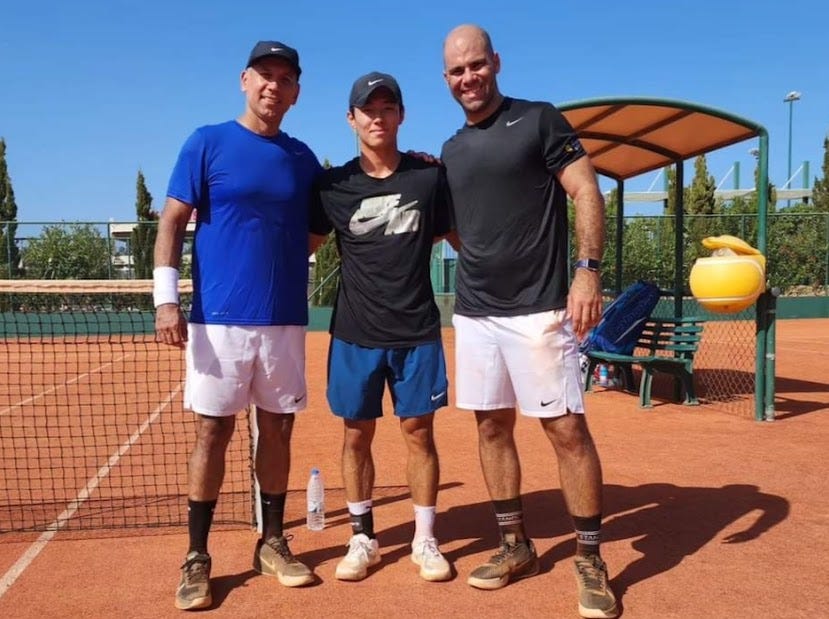Finally, First Deaf APT Duckhee Lee Will Play Today-!!
“Deafness is a part of my tennis life,” says the South Korean. “It sometimes gives me disadvantages, but it has never discouraged me.”
Most die-hard tennis fans know who South Korean Duckhee Lee is.

In 2019, Duckhee Lee made history when he became the first deaf player to compete and win an Association of Tennis Professionals (ATP) main draw match at the Winston-Salem Open. I better let you Google him.
Watch a 5-minute video about this deaf tennis player.
FINALLY-???
Today is Lee’s first-ever appearance in any tennis event sanctioned by the International Committee of Sports for the Deaf (ICSD).
Lee will face Germany’s Cedric Kaufmann in the World Deaf Tennis Championships held in Hersonissos, Greece. You can know his results by clicking the Men’s Singles Bracket daily.
As a long-time Deaflympian since 1969, I am glad that Lee finally has a chance to play in this “deaf” event. His busy ATP circuit prevented him from playing in the Deaflympics in 2017 (Turkey) and 2022 (Brazil.)
Next August will be the 100th anniversary of the ICSD. I know South Korea has not entered any tennis player into the Deaflympics. I hope that Lee will be the first South Korean to play tennis in the Deaflympics, held in Tokyo, Japan, in November 2025 (one of the slowest ATP months.)
Quick fact: To qualify for the Deaflympics, “athletes must have a hearing loss of at least 55db in their ‘better ear.’ Hearing aids, cochlear implants, and the like are not allowed to be used in competition, to place all athletes on the same level.”
I have my own Duckhee Lee story. No, I have yet met him, but Ben Rothenberg of the New York Times, one of the most influential tennis journalists, emailed me in 2016 and wrote, “We're doing this story as part of a science of sports series about the challenges and possible disadvantages Duckhee Lee might face compared to players who are able to hear how the ball comes off the racket and things like that.” So, I provided him with my tennis players’ names and email addresses.
The NYT published, “For Deaf Tennis Player, Sound Is No Barrier.”
I will quote my tennis friends’ sayings in this article for you if you cannot open this link because of being subscribed.
Katie Mancebo:
“There are so many different spins in tennis, and I can hear a lot of them coming off someone’s racket because I know what they all sound like,” said Katie Mancebo, a college tennis coach and volunteer coach for the United States deaf tennis team. “But a deaf player doesn’t know that sound, so they have to focus more on what the other person is doing, how they’re making contact, and what the ball looks like as it’s coming over the net.”
Tobias Burz:
Tobias Burz, a deaf player who now serves as the technical director for tennis at the International Committee of Sports for the Deaf, recounted an experiment he once conducted with a higher-ranked hearing opponent. After winning their first set, 6-2, his opponent was curious what it was like to be a deaf player, and used earplugs and wore headphones for their next set. Burz won, 6-3.
Paige Stringer
Paige Stringer, who founded the Global Foundation for Children with Hearing Loss, played for the University of Washington, where she had a doubles partner who was also deaf. She hypothesized that deaf players’ disadvantage in not being able to hear their opponents hit the ball can be compensated for by increased visual acuity.
“People who were born deaf or hard of hearing may have a stronger sense of intuition in general, and tend to see subtle clues in a person’s face or body language better than people with normal hearing,” Stringer said. “They are more visual, because when one sense is compromised, other senses are heightened to compensate. If my hypothesis is correct, people who are deaf or hard of hearing may have an advantage in tennis because they can pick up visual cues faster and better as to their opponent’s plans, and may have better reflexes because they see things sooner.”
Evan Pinther:
Evan Pinther, who played for Florida Gulf Coast University, cited the lack of feedback from his own strokes as his biggest cause of discomfort on court when he was restricted from using hearing amplifiers.
“My anxiety level goes up without my hearing aids,” Pinther said. “I much prefer to play with my hearing aids because I can hear the ball so much better. I always loved hearing the ball explode off my strings when I hit it perfectly; it gave me confidence to hear that sound the ball makes when hit well.”
Emily Hangstefer:
Emily Hangstefer, who played for the University of Tennessee at Chattanooga, also said the adjustment had been frustrating.
“Training for the Deaflympics, I realized I relied on hearing instead of watching or feeling the ball,” she said. “It took me about five weeks to get in the habit of watching the ball instead of hearing it. Once my hearing was taken away, I had to rely on my other senses — touch and sight.”
Back to Greece.
The ICSD tennis rule states that any new tennis face should not be seeded. Still, Lee happens to be an ATP player, so team leaders from other nations unanimously agreed to let him be the No. 1 Seed. We will see how far Lee will go!
Lee came to Hersonissos with his father and planned to practice with his father. But, my two American male players, Alfredo Galvez of Virginia and Andrew Giuffrida of California, asked Lee to practice with them. Lee accepted.
"Don't be discouraged, and if you try hard, you can do anything, you can achieve anything you want," Duckhee Lee said through an interpreter after his win at the Winston-Salem Open in 2019).


